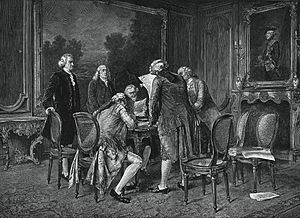Our friend represented his agency in the matter of procuring and forwarding the communications “as a public act, dealing with the public correspondence of public men.” His accusers were having none of it:
His accusers made him out to be a vindictive destroyer of public confidence. He had “forfeited all the respect of societies and of men” and was not a gentleman, rather a common thief.Into what companies will the fabricator of this iniquity hereafter go with an unembarrassed face, or with any semblance of the honest intrepidity of virtue? Men will watch him with a jealous eye &em; they will hide their papers from him, and lock up their escritoires. Having hitherto aspired after fame by his writings, he will henceforth esteem it a libel to be called a man of letters…
I am happy to hear our friend has been released by the court in London, although two days later he was fired from his job as deputy postmaster general of North America.
 We know him as Benjamin Franklin, Poor Richard, printer, diplomat,
and one of the fathers of his country.
This was the event that turned Franklin against the British Empire.
When he signed the treaty of Paris between France and America in 1782,
he wore the same suit he wore when Alexander Wedderburn maligned him before
George III’s Privy Council in 1774.
We know him as Benjamin Franklin, Poor Richard, printer, diplomat,
and one of the fathers of his country.
This was the event that turned Franklin against the British Empire.
When he signed the treaty of Paris between France and America in 1782,
he wore the same suit he wore when Alexander Wedderburn maligned him before
George III’s Privy Council in 1774.
Julian Assange is not Benjamin Franklin. Yet he stands accused of the same “crime” and is maligned for the same personal pecadilloes as did Benjamin Franklin. History will vindicate Assange and Wikileaks just as it has vindicated Franklin. Wikileaks will be more influential than Poor Richards Almanac.
The letters Franklin leaked were written by Massachusetts governor Thomas Hutchinson, recommending “some abridgment” of liberty to bring order to unruly Boston.
 I prefer
Franklin’s view:
I prefer
Franklin’s view:
“Those who would give up Essential Liberty
to purchase a little Temporary Safety,
deserve neither Liberty nor Safety.”— Benjamin Franklin, An Historical Review of the Constitution and Government of Pennsylvania, 1759
-jsq
